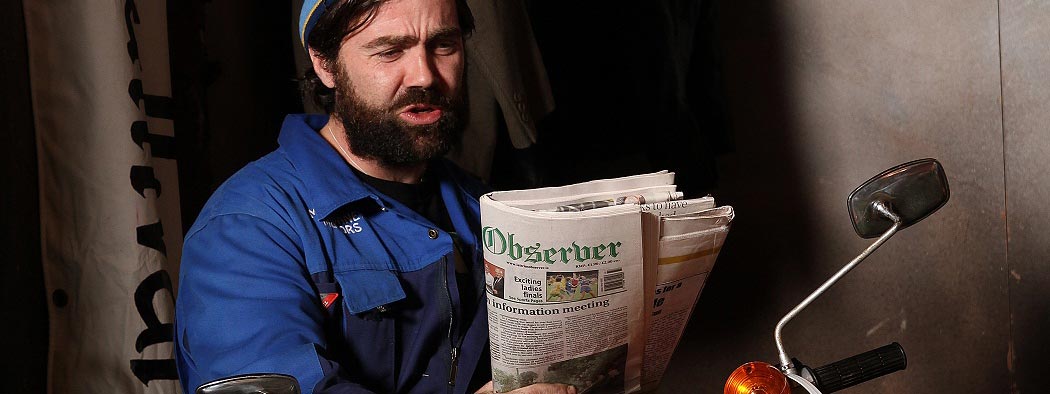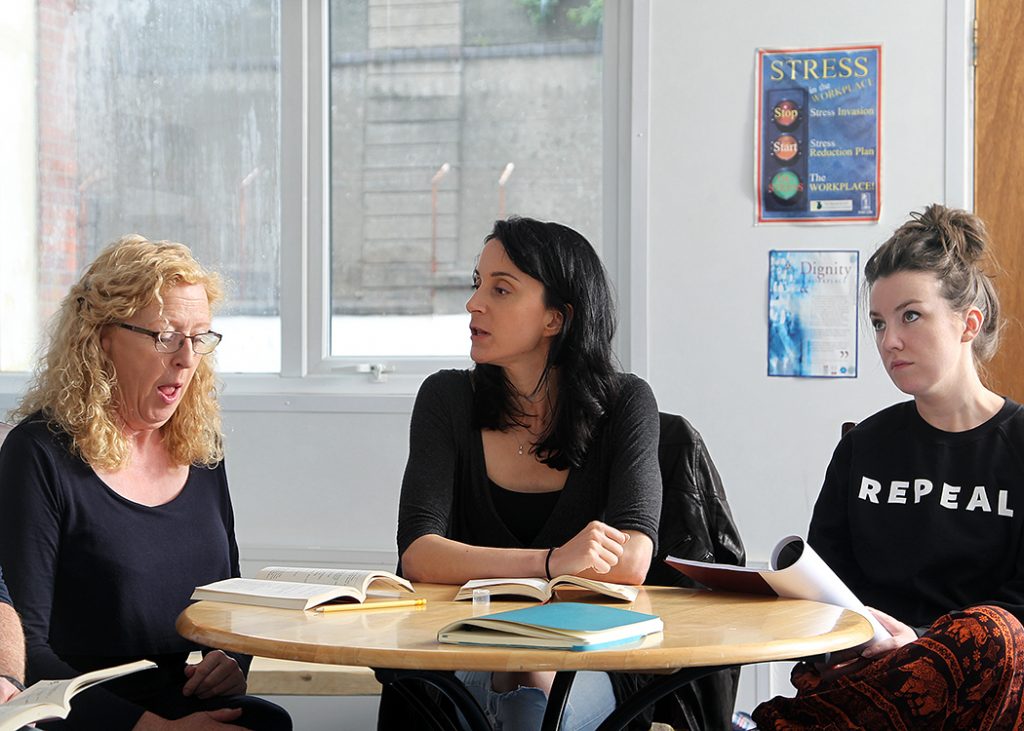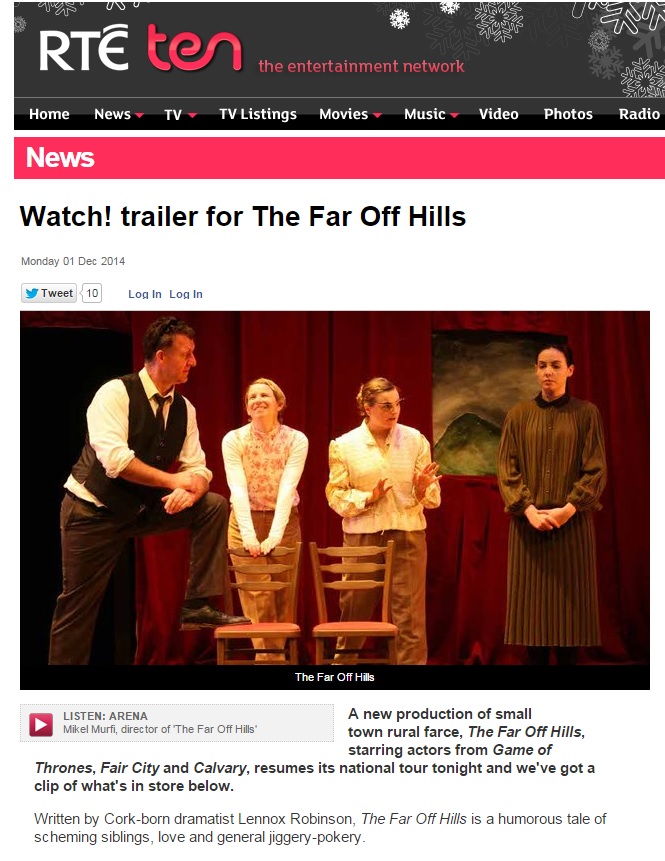Listen to extracts from Bailegangaire
Check out these audio clips from Bailegangaire, originally recorded and broadcast on RTE’s Arena, 25 August 2016.
Press Release: Tom Murphy’s Bailegangaire, touring Ireland this autumn.
NOMAD IN ASSOCIATION WITH LIVIN’ DRED THEATRE CO. presents
BAILEGANGAIRE by Tom Murphy
Directed by Padraic McIntyre
On tour from 9th September to 8th October 2016 nationwide.
“Let ye be settling now, my fondlings, and I will be giving ye a nice story tonight when I finish this. For isn’t it a good one?”
This is a major new touring production of Bailegangaire, first performed by Druid Theatre Company in 1985. Directed by Padraic McIntyre, “Tom Murphy’s extraordinary play” (Peter Crawley, Irish Times), centres around Mommo, who tells over and over again a story she never finishes of how the town came to be known as Bailegangaire, the town without laughter.
Mommo is attended by her two granddaughters, Mary and Dolly. The younger women yearn to be free of the past in order to make a new beginning, and Mary comes to believe that to do so the story of Bailegangaire has to be concluded.
“In Mommo, Tom Murphy has created one of the greatest female characters of twentieth-century Irish literature.”
“I’d place it in the same league as Brian Friel’s masterpiece, Faith Healer.” The Telegraph
Nomad Theatre Network NOMAD, was set up in January 2006 to further the development of the performing arts and extend the parameters of regional, national and international performances available to venues and their audiences. The partnership network set out to encourage more theatre companies both national and international to tour to the regions, to produce high quality theatre and ultimately to enrich and strengthen performing arts practice in the regions and shape the future development of touring.
NOMAD/Livin’ Dred Theatre Co. is delighted to announce the cast for their upcoming tour of BAILEGANGAIRE by Tom Murphy.
MOMMO Joan Sheehy
MARY Claire Monnelly
DOLLY Maeve Fitzgerald
Find out more about the cast here.
Photo: The cast meeting for their first read through of Bailegangaire, August 2016. Left to right: Joan Sheehy, Maeve Fitzgerald and Claire Monelly. See our gallery for more images.
PRESS CONTACT
Please contact Bernie McGrath for interviews or any further info on info @ milive.net and 087 9817535
WEBSITE: http://www.nomadtheatrenetwork.ie/
TWITTER: @nomad_network or @milive1 or @LivinDred
FACEBOOK: livindredtheatrecompany
Download official press image here: (300 dpi, 10MB, jpg).
Download press release with tour dates and blogs (pdf, 124 KB).
Theatre Review: Nothing could warm the cockles of one’s heart more
This good, old-fashioned comedy written by Lennox Robinson in the 1920s, now on national tour, was staged this past weekend at An Grianan Theatre in Letterkenny, Donegal, and it sparkles with the myriad talents of a quartet of versatile actors – Steve Blount, Caoimhe O’Malley, Julie Sharkey and Niamh McGrath. It runs at the Pavilion Theatre in the seaside town of Dún Laoghaire from December 16 to 18 and from December 19 to 20 at the Ramor Theatre in Virginia, county Cavan.
Displaying immense resourcefulness, the cast all play multiple roles, some both male and female and often with split-second changes from one character to the other with accompanying changes in gestures, body posture, voice and facial expressions.
So adroit were the performances that even though stage props were minimal – basically, a big blanket across the center of the stage – the play oozed verisimilitude.
Set in rural Ireland, ‘The Far Off Hills,’ Robinson’s first three-act comedy about Irish life, is a light-hearted portrayal of the marriage game and its ramifications for a simple household in which the artful scheming of two mischievous daughters plays a pivotal part.
Marian, the starchy oldest sister, rules the household with a firm hand, much to the dismay of Patrick, her father, and her more fun-loving younger sisters Pet and Ducky. But that situation changes – to the benefit of all.
In such a fast-paced production where timing is crucial, it is a difficult task to separate each actor on merit. Suffice to say, as an ensemble, they seemed to be having a thoroughly jolly time on stage, displaying an infectious enthusiasm that filtered its way down to the audience with spontaneous applause erupting throughout the show.
Steve Blount faces a triple impersonation challenge and carries it off wonderfully – playing near-blind Patrick, a father in bad need of cataract surgery, as well as depressed, deadpan lonesome local farmer, Harold Mahony, and the debonair and devilishly handsome blow-in, Pierce Hegarty.
Julie Sharkey and Niamh McGrath also face a tough task, each acting out very contrasting roles – giggly, sassy adolescent daughters scheming to get rid of their domineering, prudish older sister, and two garrulous cronies of Patrick’s keen on sharing with him gory details of the latest sensational murder.
Caoimhe O’Malley plays Marian, the prissy older sister, to a tee, talking endlessly about her vocation to be a nun, hiding her father’s whisky, warning him about his cronies and boring him with banal readings from ‘The Observer.’
What was also admirable about the cast was the easy, relaxed rapport they struck up with the audience. Right from the start, most unusual in theatre, Blount introduced each actor who stopped fussing with props on stage and said a few words about who they were. Even during the play itself, the actors confidently interacted spontaneously with the audience when the opportunity presented itself, as when a gift box containing a dress for Marian from Pierce slid accidentally off the stage and when an audience member sneezed.
The set, while simple in nature, helped create a two-dimensional effect, with cast members behind and to the side of the ‘blanket,’ which acted as a wall, carrying out peripheral activities as the main action continued stage center.
‘The Far Off Hills’ is produced by Loco and Reckless Productions in association with Nomad Theatre Network.
Set and costume design is by Sabine Dargent and lighting design by Nick McCall.
Theatre Review: Undemanding charm of Far Off Hills
By Emer O’Kelly Sunday Independent 08/12/2014
Why has Lennox Robinson been so neglected and under-rated by Irish theatre over the years; apart from his being Protestant, neurotic, and a bit spiteful, that is?
Those personal qualities didn’t make him unique among playwrights and directors in Ireland, or within the Abbey. But his writing talent glowed, and came damn close to being unique in its wry, understated observance of small-town and rural Irish society in the first half of the 20th Century. His plays are set in the Ireland in which he grew up – middle-class families of comfortable means, with conservatories, tennis courts, and pretty gardens.
Robinson hit the nail on that head, whether in serious or comic vein, and most of the time, there was a faint but recognisable core of irony in the work which saved its gentle perspicacity from disintegrating into sentimentality.
So Loco and Reckless Productions (in association with the Nomad network) are doing a considerable service in their current tour by re-introducing audiences to The Far Off Hills, in an only slightly tongue-in- cheek production by Mikel Murfi, with the four cast members playing all 10 characters….and very creditably indeed.
Nowadays, Hollywood would call the play a romcom, with the young(ish) widower Patrick Clancy nobly writing himself off as husband material because he is awaiting a cataract operation on his eyes, and is currently (and possibly permanently) blind. (This is 1928.)
Sanctimonious 22-year- old eldest daughter Marion wants to be a nun, but is sacrificing herself on the altar of family duty to care for him and her two flighty teenage sisters, neither of whom is particularly grateful for the sacrifice. And then there’s lovely, staunch (and not quite on the shelf) family friend Susie. And to add to the mix, Susie’s dashing 22-year-old nephew hoves into view.
It’s lovely, undemanding, charming fun delivered with considerably adroit aplomb, particularly by Steve Blount in the two main male roles, and Niamh McGrath as Susie and young “Pet”, with Caoimhe O’Malley as prissy Marian, and Julie Sharkey completing the cast. It’s lit by Nick McCall and designed by Sabine Dargent.
The Far Off Hills was at Draiocht in Blanchardstown, and will tour to Longford, Castlebar, Letterkenny, and Virginia, Co Cavan.
Kings, guns and riots: Lennox nearly ruined the Abbey
Irish Independent – Saturday 07/12/2014
Lennox Robinson is barely remembered now as the author of a series of comic capers that used to be staples of the Abbey repertoire: one of these, The Far Off Hills, is touring till December 20 in a production directed by Mikel Murfi, and likely to be hilarious. (It’s at the Backstage Theatre in Longford tonight. See www.nomadtheatrenetwork.ie.)
But Robinson’s career with the Abbey was quite the comedy caper itself. He was hired by Yeats and Lady Gregory to run the Abbey in 1909, aged just 22, on the strength of his promise as a playwright.
This was “fantastical,” he wrote, later: he “knew next to nothing of the theatre” and “had a very poor education.” Still, he seized the chance.
One Saturday morning the following May, he was in the office when he learned of the death of King Edward VII. The other Dublin theatres would close for the day, he knew; but “did the national Abbey Theatre take notice of the demise of an English king?”
Yeats was abroad; he wired Lady Gregory for advice. No answer came. He and the company agreed to play the matinee.
While it was on, Gregory’s cable arrived: “better close through courtesy”. But by then, thought Robinson, “the mischief had been done.” They went ahead and played the evening show.
The Abbey was funded by the English philanthropist Annie Horniman. Furious, she demanded Robinson be fired; Yeats backed Robinson; Horniman withdrew her subsidy.
In search of alternative income, the Abbey looked to the United States. Robinson organised its first tour in 1911 and saw the entire company arrested. Irish-Americans objected to Synge’s The Playboy of the Western World and another play, Birthright by TC Murray. There were protests and a mini-riot, but the plays packed out (and the company got off). It was “a real triumph,” wrote Gregory.
Another tour, in 1914, lost money and Robinson quit. In 1916, he had his first big success as a writer, The Whiteheaded Boy. In 1919, he returned as manager, and was in situ to face the new challenges that war posted to the theatre.
In January 1921, an ex-serviceman was “assassinated” while at a show at the Empire Theatre. In February, during a rehearsal of The Revolutionist by the late republican hunger-striker, Terence MacSwiney, the Abbey was raided by a group of men brandishing revolvers.
They stormed the theatre looking for a press photographer who was attending the rehearsal, and who they alleged had faked some photos. Nobody was hurt; the photographer lost his camera. Robinson dismissed it later as “a ridiculous incident.”
Dublin was then under curfew and few people were going to the theatre. When the curfew was moved earlier, the theatres responded by moving their showtimes to the early evening. But then the curfew came back to 8pm, and the Abbey had to close.
With fixed costs but no income, it faced bankruptcy. This newspaper warned: “When the Abbey is gone the Mirror of Ireland is broken, and not for a long time can we again see our sins and our virtues, our follies and our wisdom, our satire and our invective, reflected so truthfully and so fearlessly.”
Robinson led a fundraising campaign. Some of the Abbey’s stars were playing in a commercial production of The Whiteheaded Boy in the West End, and they held a fundraising matinee. The Abbey survived and, shortly afterwards, Robinson, Yeats and Lady Gregory started petitioning for funding from the new Free State government (in 1925 they succeeded).
I wrote here recently that the Abbey needed to find a “quick and dirty” way to rush new plays to the stage, on the cheap.
As part of the fundraising campaign, Robinson confronted criticism that the Abbey had been coasting on its repertoire and was not risking new plays. Robinson pointed out that war had damaged the pipeline, but conceded that new plays didn’t do the business at the box office. It was time, he suggested, “for some new movement to try plays in an inexpensive way and give young playwrights their chance on that line.”
Nearly a century on, one such movement is Dublin’s Theatre Upstairs, staging new plays above Lanigan’s Bar. Director Karl Shiels has two plays on next week: at the Theatre Upstairs is Petals by Gillian Greer, a verse play about a sexual coming-of-age, and at the Axis in Ballymun is Gemma Doorly’s new comedy, Joe Prop, which deals with bullying and is being staged in association with Barnardos.
Interview with Mikel Murfi in The Irish Mail on Sunday

Great interview with Mikel Murfi in The Irish Mail on Sunday
Irish Independent – ‘The Far Off Hills’ the Number 1 must see show
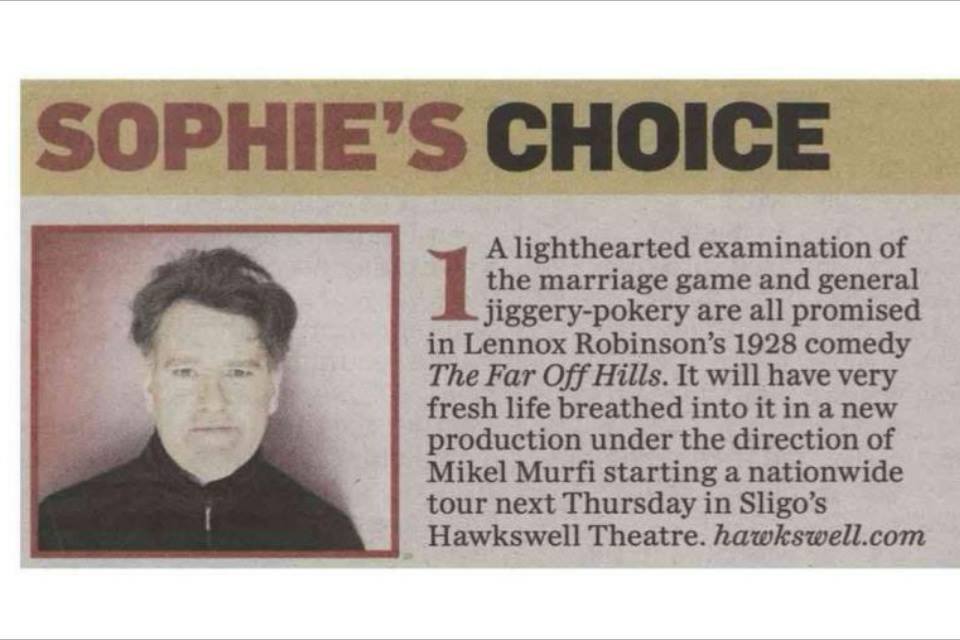
Delighted that the Irish Independent has honoured ‘The Far Off Hills’ as their Number 1 must see show.
Front Page of Irish Times
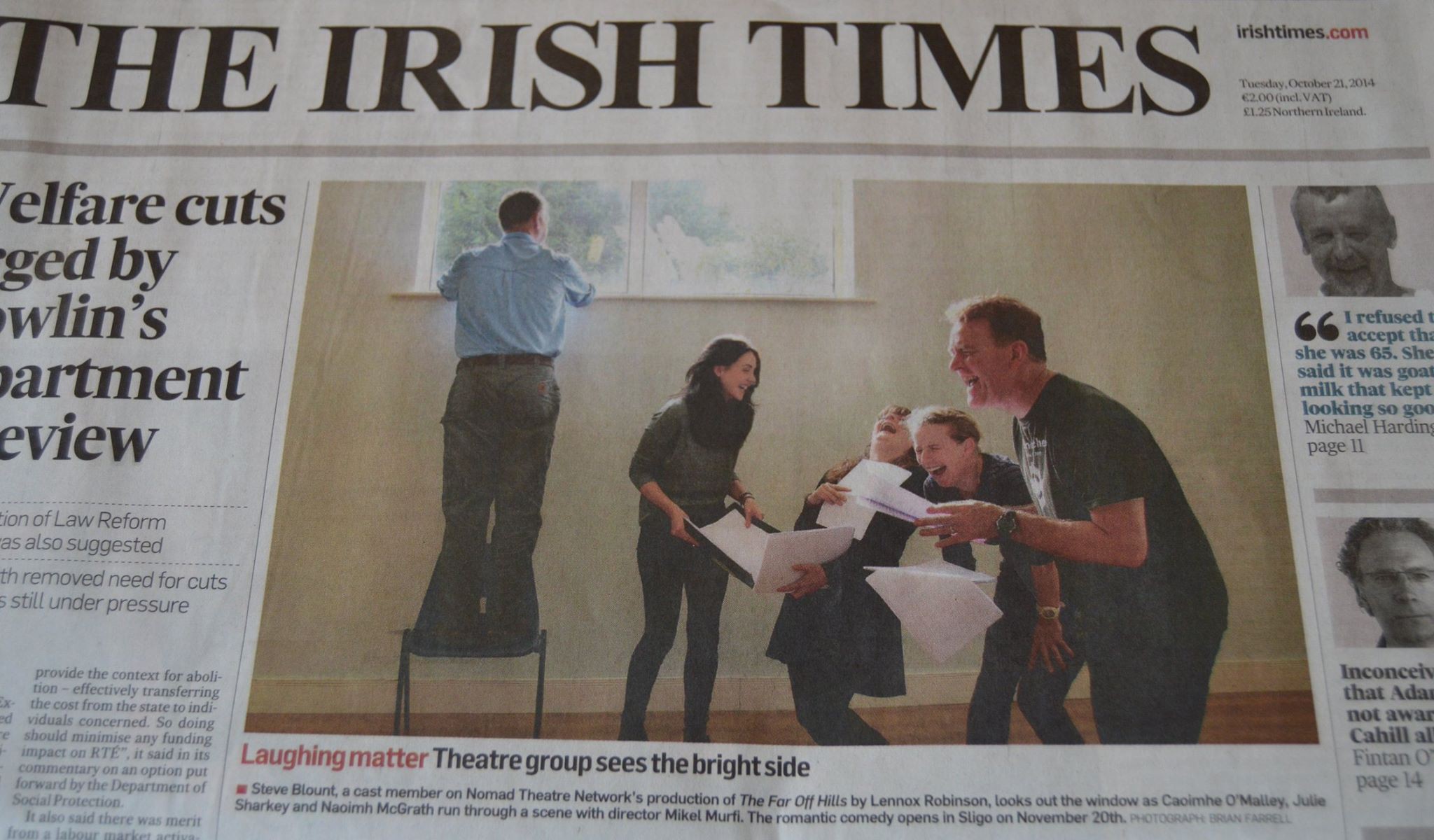
We are front page news on today’s Irish Times.
Rehearsals for The Far Off Hills are going brilliantly! Can’t wait to share the laughter with you next month.
2014 National Tour
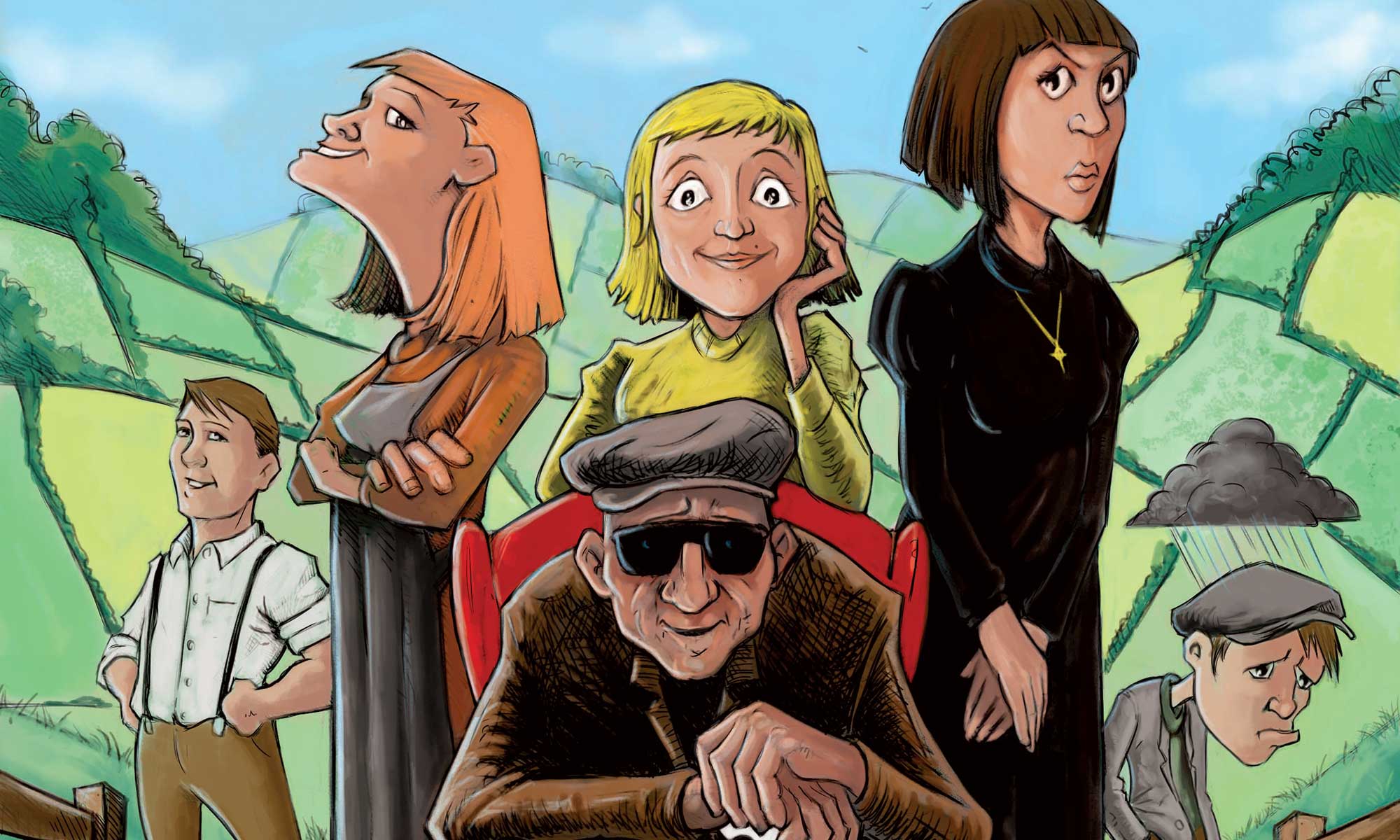
Delighted to announce our 2014 National Tour! Nomad Theatre Network in association with Loco and Reckless Productions present Lennox Robinson’s The Far Off Hills.

